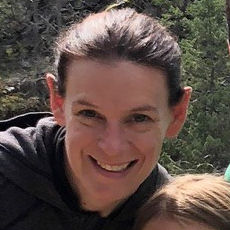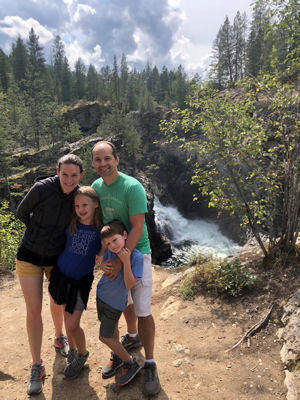
Stephanie Fosback, MD, FACP
General Internal Medicine Physician, Palouse Medical/Pullman Regional Hospital, Pullman, WA
Clinical Assistant Professor, University of Washington School of Medicine
— MEDICAL SCHOOL AND INTERNAL MEDICINE RESIDENCY —
University of Washington School of Medicine
What is your current position?
I am a general internal medicine physician in Pullman, Washington (population 30,000). I have had the joy of practicing inpatient and outpatient medicine for the past 12 years.
Where did you attend medical school and postgrad training?
I attended medical school and residency at the University of Washington School of Medicine. I had the joy of doing my first year in the WWAMI program in Pullman (a collaboration of the University of Washington with Washington State University and the University of Idaho). This program led me to Pullman.
Why did you choose to become a physician?
I think this is the hardest question of all. I went into medicine to connect with people and try to make a difference in an underserved area of health care. I think a better way to answer this question for me now, 12 years into my career, is to tell you that I continue to choose to be a physician because this profession gives me the gift of connecting with people and working with them to make their health—and hopefully their lives—better. I have also had the blessing to learn over the years that patients take care of me just as I do them.
What field of internal medicine did you select and why?
I chose the broad area of general internal medicine because I could not imagine focusing on one thing all day. I enjoy the challenge of each area of medicine and the diversity of my day. My specialty is “no specialty.”
Please describe a typical day in your practice.
I begin my day by cooking for my kids and taking them to school. I know this is not in “my practice,” but I think it is important to mention I am a mother, wife, and physician. I have coordinated a cardiac catheterization of a patient with atypical angina in the “kiss-and-go” lane while dropping my kids off at school.
After dropping off the kids, I begin work around 8:30 a.m. and see around 16 to 18 patients in the day. I also teach third-year medical students 2 days per week. It is my favorite thing that I do in medicine. Medical students remind me daily why I love what I do. Their enthusiasm is contagious. I usually eat a lunch rapidly at my desk while charting and then try to be completely done with work by 5:30. As a rule, I do not work at home. I do study at home (usually 4 hours per week give or take). I want my family time to be just that.
What are some of your special interests professionally?
Where I live, I have grown to fill in the care gaps as they are. Specifically, I do a fair amount of endocrinology, LGBTQ care (with gender affirmation for those on the gender spectrum who use hormonal therapy), cardiac care, pulmonary care, and psychiatric care. I have also joined with a psychologist and more recently an ANRP who specializes in psychiatry to provide collaborative care for those who need it.
What are your interests and hobbies outside of medicine?
I love time with my family, reading, skiing (snow and water), walking with my friends and dog, and coaching soccer.

What advice would you like to share with medical students, or what do you wish someone would have told you while you were in medical school?
Don't be afraid to fail. Don't be afraid to be wrong. My greatest accomplishments come from my greatest failures. The journey is more important than the goal.
Which living person do you most admire?
My husband. He worked from home while homeschooling our two children during the pandemic and never seemed flustered by it. All the while, I was working too much and in the thick of the COVID-19 response in our town. I am grateful to him for his energy and sense of humor.
Which talent would you most like to have?
I wish I could play the piano (I play a little but not enough to do what I want with it). I love to sing, and I think it would be amazing to be able to sit, play, and sing all at once.
If you could change one thing about yourself, what would it be?
I wish I talked less and listened more.
What is your motto?
“You can do anything, but not everything.”
Back to the June 2021 issue of ACP IMpact
More I.M. Internal Medicine Profiles

